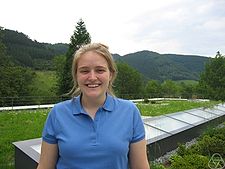Melanie Wood
Melanie Wood | |
|---|---|
 Melanie Wood in 2007 (photo from MFO) | |
| Born | 1981 (age 43–44) |
| Nationality | American |
| Alma mater | Duke University Princeton University |
| Awards | Morgan Prize (2004) |
| Scientific career | |
| Fields | Mathematics |
| Institutions | Stanford University University of Wisconsin |
| Doctoral advisor | Manjul Bhargava |
Melanie Matchett Wood (born 1981[1]) is an American mathematician who became the first female American to make the U.S. International Mathematical Olympiad Team. She completed her Ph.D. in 2009 at Princeton University (under Manjul Bhargava) and is currently an Assistant Professor at the University of Wisconsin, after spending 2 years as Szegö Assistant Professor at Stanford University.
Wood was born in Indianapolis, Indiana, to Sherry Eggers and Archie Wood, both middle school teachers. Her father died of cancer when Wood was six weeks old.[2] While a high school student at Park Tudor School in Indianapolis, Melanie (then aged 16) became the first, and until 2004 the only female American to make the U.S. International Math Olympiad Team, receiving silver medals in the 1998 and 1999 International Mathematical Olympiad.[3] At her school, in addition to being a math wiz, Melanie was a cheerleader and student newspaper editor.[4]
Melanie graduated from Duke University where she won a Gates Cambridge Scholarship, Fulbright fellowship, and a National Science Foundation graduate fellowship in 2003, in addition to becoming the first American woman and second woman overall to be named a Putnam Fellow in 2002.[5][6][7] During the 2003–2004 year she studied at Cambridge University. She was also named the Deputy Leader of the U.S. team that finished second overall at the 2005 International Mathematical Olympiad.
In 2004, she won the Morgan Prize for work in two topics, Belyi-extending maps and P-orderings, making her the first woman to win this award.[3][7] Her paper on the second topic was published in the Journal of Number Theory.
In 2012 she became a fellow of the American Mathematical Society.[8]
Selected publications
- Wood, Melanie (2003). "P-orderings: a metric viewpoint and the non-existence of simultaneous orderings". Journal of Number Theory. 99 (1): 36–56. doi:10.1016/S0022-314X(02)00056-2. MR1957243.
References
- ^ http://www.awm-math.org/biographies/contest/LeenaShah2007.html
- ^ Olson, Steven (2005). Count Down: Six Kids Vie for Glory at the World's Toughest Math Competition. Houghton Mifflin Harcourt. p. 18. ISBN 0-618-56212-5.
- ^ a b http://www.maa.org/news/melanie-wood-interview.html
- ^ Rimer, Sara (2008-10-10). "Math Skills Suffer in U.S., Study Finds". New York Times. Retrieved 2008-10-10.
- ^ http://www.dukemagazine.duke.edu/issues/010210/figure-where.html
- ^ http://www.cogito.org/Articles/ArticleDetail.aspx?ContentID=15504
- ^ a b http://www.ams.org/notices/200404/comm-morgan.pdf
- ^ List of Fellows of the American Mathematical Society, retrieved 2013-09-01.
External links
- An Interview with Melanie Matchett Wood (The Girls' Angle Bulletin)
- A Conversation with Melanie Wood (Math Horizons magazine)
- The Girl Who Loved Math (Discover magazine)
- Melanie Wood: The Making of a Mathematician (Duke University profile)
- Melanie Wood (homepage at Stanford University)
- Rimer, Sara (October 10, 2008). "Math Skills Suffer in U.S., Study Finds". New York Times.
- Melanie Wood at the Mathematics Genealogy Project
- Melanie Wood's results at International Mathematical Olympiad
